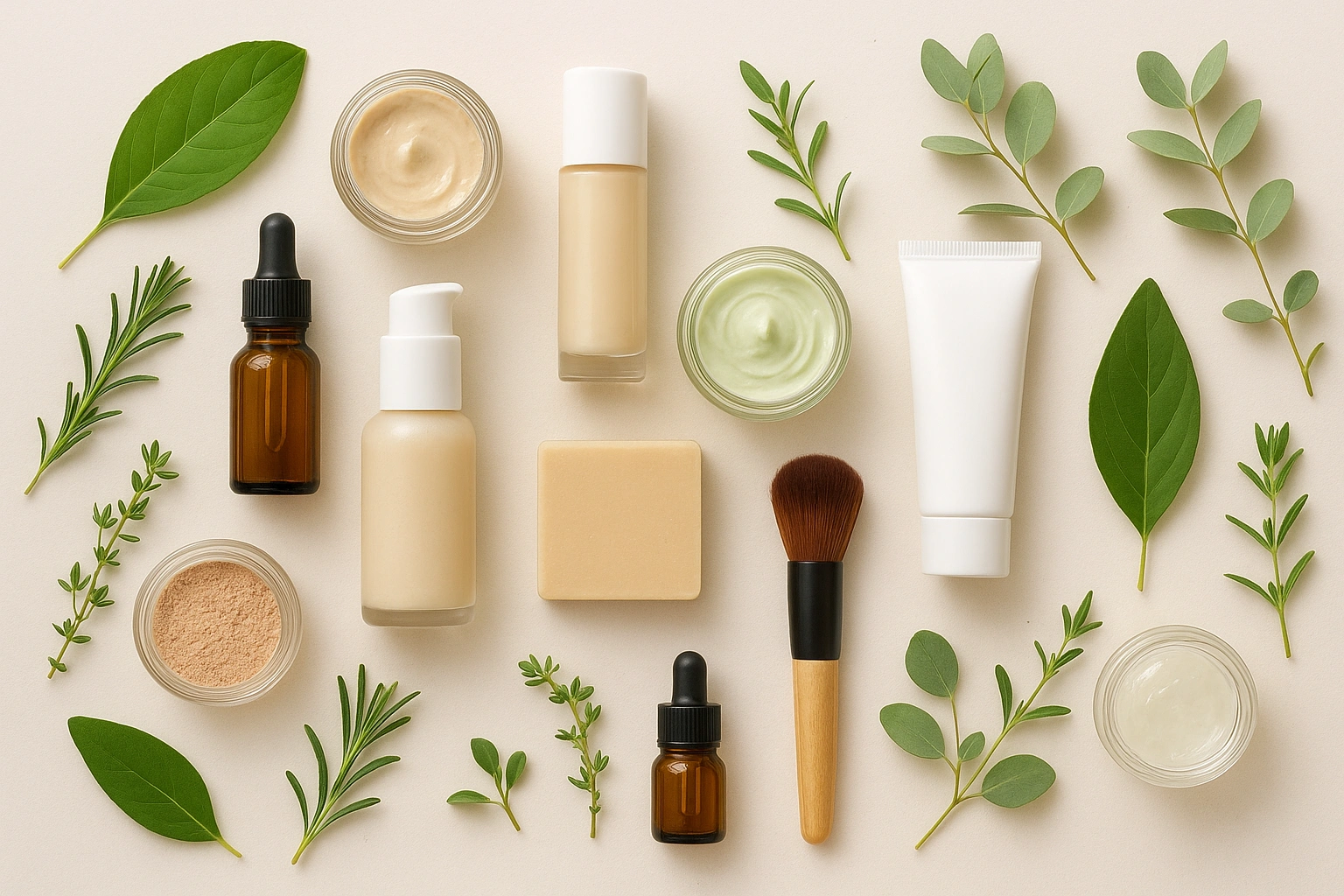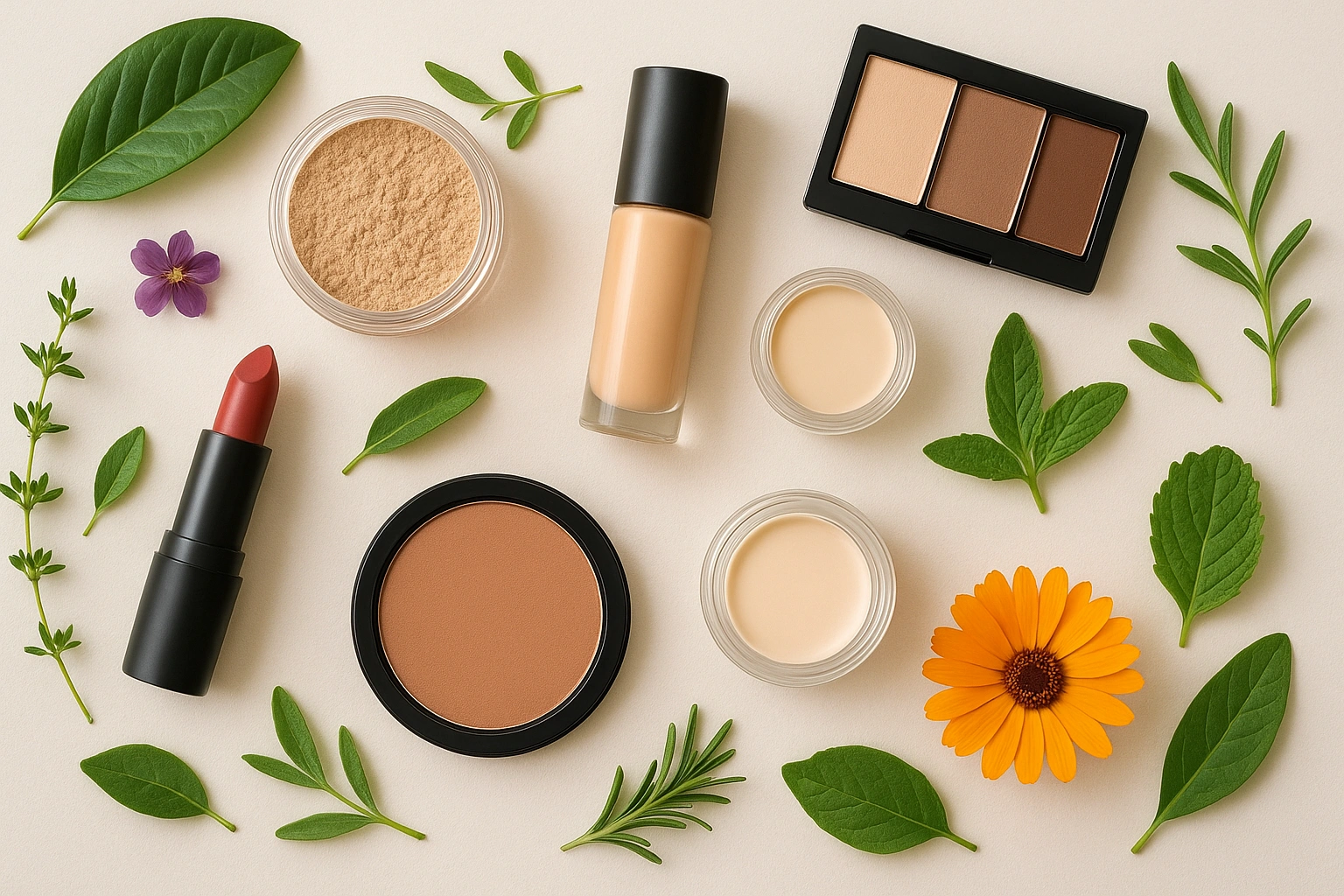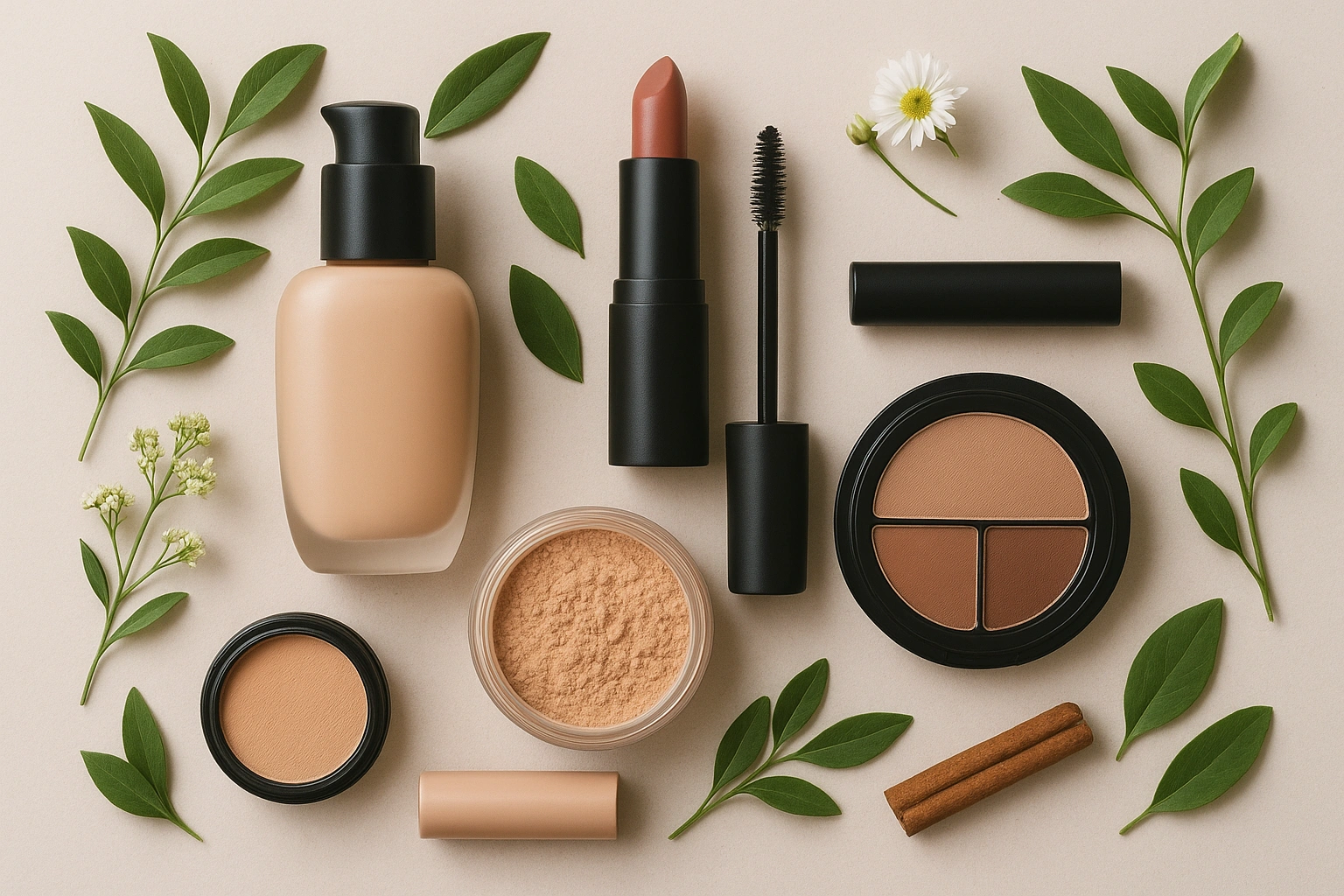Your skin absorbs up to 60% of what you put on it. Let that sink in for a moment. This simple fact highlights one of the key benefits of organic makeup—when you choose cleaner formulas, you’re putting safer, more nourishing ingredients directly into your skin. It’s worth asking yourself what’s really in the makeup you wear every single day.
For decades, we’ve accepted complex, chemical-heavy ingredient lists as the standard in our makeup bags. But the benefits of organic makeup show us there’s a better way. As more people become mindful about what goes into their bodies, it’s only natural to extend that same care to what we put on our faces. The clean beauty movement isn’t just a trend; it’s a shift toward healthier self-care.
This article explores the deeper benefits of organic makeup, going beyond surface claims to show why these formulas are a long-term investment for your skin’s health. By making the switch, you’re choosing ingredients that nourish rather than irritate, protect rather than pollute, and support both personal wellness and environmental sustainability.
By the end of this guide, you’ll fully understand the benefits of organic makeup, learn the science behind why these formulas truly work, and feel empowered to select clean products with confidence. More importantly, you’ll be inspired to build a beauty routine that enhances your skin while aligning with your values—proving that healthy choices can also be beautiful ones.
- Decoding “Organic”: What Does It Really Mean?
- The Top 7 Benefits of Organic Makeup for Your Skin
- Conventional vs. Organic: A Side-by-Side Ingredient Comparison
- Common Myths and Mistakes When Switching to Clean Beauty
- Expert Tips for Making the Switch
- Frequently Asked Questions (FAQ)
- Invest in Your Skin’s Future
Decoding “Organic”: What Does It Really Mean?
In the world of beauty, terms like “natural,” “green,” and “clean” are used so often that they sometimes lose their real meaning. That’s where the benefits of organic makeup truly stand out, because they are based on clear standards rather than vague marketing.
Unlike other labels, “organic” is different. It’s a regulated term with strict requirements that guarantee authenticity. Choosing products that meet these standards means you’re not just following a trend, but actually enjoying the benefits of organic makeup in your daily routine.
For a makeup product to be certified organic, every ingredient must be grown and processed without synthetic pesticides, artificial fertilizers, or GMOs. This purity is what makes the benefits of organic makeup so valuable, offering a safer and healthier option for your skin.
It’s essentially a farm-to-face philosophy that ensures both potency and safety. When you choose this path, you’re embracing the full benefits of organic makeup—clean formulas that nourish your skin and align with a more conscious lifestyle.
This commitment to purity is driving a massive shift in the beauty industry. The global market for organic personal care is projected to reach nearly $59 billion by 2030, according to [Statista]. This isn’t just a trend; it’s a fundamental change in how we approach beauty and wellness.

The Top 7 Benefits of Organic Makeup for Your Skin
Switching to organic makeup isn’t just about avoiding harmful ingredients; it’s about experiencing the real benefits of organic makeup that transform how your skin feels and looks.
When you choose cleaner formulas, the benefits of organic makeup become clear through healthier, calmer, and more radiant skin that responds better to nourishing ingredients.
It’s also worth noting that the benefits of organic makeup extend beyond surface beauty, giving your complexion long-term protection while reducing irritation and sensitivity.
Ultimately, embracing the benefits of organic makeup means you’re not just wearing safer products—you’re building a routine that supports both your skin and overall well-being.
1. You Avoid Harsh Chemicals and Irritants

Conventional makeup is often formulated with a cocktail of synthetic chemicals that can disrupt the skin’s delicate balance. Organic makeup leaves them out.
- No Parabens: Linked to endocrine disruption and skin irritation.
- No Phthalates: Often hidden in “fragrance,” these are potential hormone disruptors.
- No Synthetic Dyes: Derived from petroleum, they can cause allergies and clog pores.
2. It’s Packed with Nourishing Ingredients
Organic makeup is essentially skincare. The formulas are built on a base of beneficial, nutrient-rich ingredients that actively improve your skin’s health. Instead of silicone, you get avocado butter. Instead of artificial fragrance, you get rose oil. These ingredients are rich in vitamins, antioxidants, and essential fatty acids that feed your skin.
3. It’s Naturally Gentler on the Skin
Without all the harsh chemicals, organic makeup is far less likely to cause breakouts, redness, and irritation. This makes it the undisputed champion for sensitive, acne-prone, or reactive skin types. The focus on soothing botanicals helps to calm inflammation rather than cause it.
4. It Works With Your Skin, Not Against It
Many conventional products, especially foundations, use ingredients like mineral oil and silicones that create an occlusive barrier on the skin. This can trap bacteria and sweat, leading to clogged pores. Organic formulas use breathable plant oils and waxes that work in harmony with your skin’s natural functions.
5. Powerful Anti-Aging Properties
Many of the plant-based ingredients used in organic makeup are potent antioxidants. Vitamins A, C, and E, found in ingredients like rosehip oil and fruit pigments, help fight free radical damage from pollution and UV rays—a major cause of premature aging. The future of technology, much like in beauty, is leaning towards sustainable and intelligent systems, a vision shared by innovators like AI Robotics.
6. It’s Better for the Planet
The **benefits of organic makeup** extend beyond your skin. Organic farming practices are sustainable, protecting soil, water, and biodiversity. By choosing organic, you’re supporting a system that is kinder to the Earth.
7. You Get Peace of Mind
There’s a profound comfort in knowing that the products you use daily are safe, pure, and ethically made. This transparency and trust are at the core of the clean beauty movement.
Conventional vs. Organic: A Side-by-Side Ingredient Comparison
Let’s break down the difference with a look at common ingredients for a typical foundation.
| Ingredient Type | Conventional Makeup | Organic Makeup |
|---|---|---|
| Base | Silicones (Dimethicone), Talc | Aloe Vera Juice, Plant Oils (Jojoba) |
| Pigments | Artificial Dyes (FD&C colors) | Iron Oxides, Fruit Pigments, Cocoa Powder |
| Preservatives | Parabens, Formaldehyde-releasers | Vitamin E, Rosemary Extract, Radish Root Ferment |
| Fragrance | Synthetic “Parfum” (Phthalates) | Essential Oils, Vanilla Planifolia |
Common Myths and Mistakes When Switching to Clean Beauty
- Myth: It’s Not as Effective. This is outdated thinking. Modern organic makeup offers incredible performance, pigmentation, and longevity.
- Mistake: Confusing “Vegan” with “Organic”. A product can be vegan (no animal products) but not organic. Look for both labels if both are important to you.
- Myth: It’s All Expensive. While luxury organic brands exist, there are many affordable and high-quality options from brands like W3LL PEOPLE and Pacifica.
- Mistake: Not Giving Your Skin Time to Adjust. Your skin might need a week or two to rebalance after you stop using synthetic-heavy products. Be patient.
- Myth: “Chemical-Free” is a Thing. Everything, including water, is a chemical. The goal is to be “toxic-chemical-free.” Look for brands that are transparent about which chemicals they use and avoid.
Expert Tips for Making the Switch
Ready to clean up your makeup bag? Here’s how to do it effectively.
- Start with Your “Leave-On” Products: Prioritize switching foundation, concealer, and lipstick first, as these stay on your skin the longest.
- Learn to Read Labels: Look for certification seals like USDA Organic or ECOCERT. Be wary of vague marketing terms.
- Understand Natural Shelf Life: Organic products may have a shorter shelf life because they use natural preservatives. Check the Period After Opening (PAO) symbol.
- Embrace the Skincare Benefits:
“The biggest mindset shift is to see your makeup as the final step of your skincare routine,” says clean beauty expert and esthetician Maya Thompson. “When your foundation is full of antioxidants and hydrating oils, you’re treating your skin all day long.”
Frequently Asked Questions (FAQ)
Q: Is organic makeup actually better for your skin?
A: Yes, organic makeup is generally much better for your skin. It avoids harsh chemicals, synthetic fragrances, and preservatives that can cause irritation, clogged pores, and allergic reactions. Instead, it uses nourishing, plant-based ingredients that can actively improve your skin’s health over time.
Q: Will my skin ‘detox’ when I switch to clean beauty products?
A: Some people experience a brief adjustment period, sometimes called a ‘skin detox,’ where their skin might break out as it purges synthetic ingredients. This is temporary and usually a sign that your skin is rebalancing itself. Sticking with your new routine will lead to clearer, healthier skin.
Q: Are organic makeup products as effective as conventional ones?
A: Absolutely. The performance of clean beauty products has improved dramatically. Today’s organic makeup offers incredible pigmentation, long-lasting wear, and luxurious textures that rival and often outperform their conventional counterparts, all without compromising on safety.
Q: How can I start incorporating organic makeup into my routine?
A: A great way to start is by replacing the products you use most often or that cover the largest area of skin, like foundation, concealer, or lipstick. You don’t have to switch everything at once. Gradually replace items as you run out.
Q: Is ‘natural’ makeup the same as ‘organic’ makeup?
A: No, they are not the same. ‘Organic’ is a legally protected and regulated term that requires ingredients to meet strict standards. ‘Natural’ is an unregulated marketing term that any brand can use, so it’s less reliable. Always look for official organic certifications for a guarantee of purity.
Invest in Your Skin’s Future
The benefits of organic makeup are clear, compelling, and supported by science. Choosing this path means giving your skin the purest ingredients from nature, while avoiding unnecessary chemicals that often do more harm than good.
When you commit to the benefits of organic makeup, you’re not only protecting your skin from harmful toxins but also investing in long-term health and radiance. It’s about building a routine that works with your skin instead of against it.
Another reason many switch is because the benefits of organic makeup also extend to the planet. By supporting sustainable farming and eco-friendly practices, you’re making a conscious choice that goes beyond personal beauty.
Ultimately, embracing the benefits of organic makeup is more than just wearing clean beauty products. It’s a form of daily self-care that nurtures your skin and aligns with values of health, sustainability, and kindness. Your complexion—and the Earth—will thank you for it.
Are you ready to make the switch? Share your favorite clean beauty product in the comments below!
